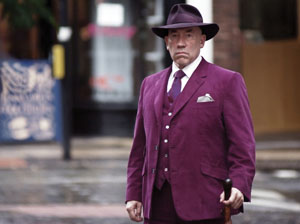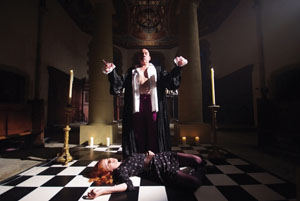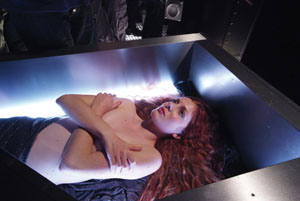 Britain, as a nation, has always had a fascination for the occult, probably because of its pagan roots. Even morris dancing, that most innocuous (and ridiculed) of English activities, is derived from pagan ceremonies. It was the invading Christians that subjugated the pagans by turning their god, cloven-hoofed Pan, into the satanic form we are all familiar with, and placating them by switching their ceremonies, to Christian ones like Christmas. And there is the long tradition of esoteric societies such as the Masons, or the more recent Theosophists. What has always been of great attraction to the world of the occult is the promise of naked, nubile women, especially for teenage boys, and it certainly had an influence on modern music for bands like Black Sabbath and Iron Maiden. And the poster boy for the British occult world was one Aleister Crowley. Crowley was to the occult what Quentin Crisp was to the civil service: a man whose flamboyant behaviour shocked contemporary society, although Crowley’s sexual proclivities were bizarre, it was his reputed powers that established his reputation. How much of his occult powers were real, and how much were show and ways of fulfilling his sexual mores is a matter for debate, and one that won’t be entered into here, but one that is explored in Julian Doyle’s movie, CHEMICAL WEDDING, which he co-wrote with Iron Maiden front man Bruce Dickinson. Although this is not a biopic, it does explore the world, and the cult, of Mr Crowley (aka The Beast), by bringing him back to life in modern Cambridge.
Britain, as a nation, has always had a fascination for the occult, probably because of its pagan roots. Even morris dancing, that most innocuous (and ridiculed) of English activities, is derived from pagan ceremonies. It was the invading Christians that subjugated the pagans by turning their god, cloven-hoofed Pan, into the satanic form we are all familiar with, and placating them by switching their ceremonies, to Christian ones like Christmas. And there is the long tradition of esoteric societies such as the Masons, or the more recent Theosophists. What has always been of great attraction to the world of the occult is the promise of naked, nubile women, especially for teenage boys, and it certainly had an influence on modern music for bands like Black Sabbath and Iron Maiden. And the poster boy for the British occult world was one Aleister Crowley. Crowley was to the occult what Quentin Crisp was to the civil service: a man whose flamboyant behaviour shocked contemporary society, although Crowley’s sexual proclivities were bizarre, it was his reputed powers that established his reputation. How much of his occult powers were real, and how much were show and ways of fulfilling his sexual mores is a matter for debate, and one that won’t be entered into here, but one that is explored in Julian Doyle’s movie, CHEMICAL WEDDING, which he co-wrote with Iron Maiden front man Bruce Dickinson. Although this is not a biopic, it does explore the world, and the cult, of Mr Crowley (aka The Beast), by bringing him back to life in modern Cambridge.
 In a laboratory at Cambridge University, groundbreaking experiments are afoot to fully integrate a computer program with the human brain using a state-of-the art ‘interactive suit’ linked to the biggest super-computer in the world – the Z93 (not to be confused with the less powerful Sinclair ZX81, which also came from Cambridge). Dr. Neuman (Jud Charlton) a Cambridge boffin and an obsessive follower of the turn of the century occult leader, Aleister Crowley, has reduced Crowley’s occult rites to a series of equations and entered them in to the Z93. Bumbling academic, and ersatz magician, Professor Haddo (Simon Callow) is the willing volunteer, desperate to get inside the mind of the long-dead Crowley, in this ultimate ‘virtual-reality’ computer game experience.
In a laboratory at Cambridge University, groundbreaking experiments are afoot to fully integrate a computer program with the human brain using a state-of-the art ‘interactive suit’ linked to the biggest super-computer in the world – the Z93 (not to be confused with the less powerful Sinclair ZX81, which also came from Cambridge). Dr. Neuman (Jud Charlton) a Cambridge boffin and an obsessive follower of the turn of the century occult leader, Aleister Crowley, has reduced Crowley’s occult rites to a series of equations and entered them in to the Z93. Bumbling academic, and ersatz magician, Professor Haddo (Simon Callow) is the willing volunteer, desperate to get inside the mind of the long-dead Crowley, in this ultimate ‘virtual-reality’ computer game experience.
When Neuman fires up the suit the computer generates a staggering array of occult and chaos images, feeding them directly into Haddo’s brain and transforming him from a shy and stuttering academic into the charismatic but sexually depraved Crowley who wreaks havoc with the students and faculty of today’s Cambridge campus.
Haddo’s arrogance and depraved appetites mirror the nature of his dead leader to the point where he believes himself to be the reincarnation of Crowley. A wild fantasy, perhaps, but somehow as he plays out Crowley’s rituals Dr. Neuman and his associates realise he has knowledge that only the real Crowley could have. Could this be Aleister Crowley reincarnated, and if so, how do they send him back to the hell from which he came?
This movie’s strengths mostly lie with Simon Callow’s outrageously bravura performance as Haddo, not as the stuttering professor but as Crowley incarnate. This is far removed from his many portrayals of Charles Dickens, a role he was made to play, just as Stephen Fry was to be Oscar Wilde, or Ron Perleman Hellboy. Having said that, John Shrapnel’s portrayal as the dying Crowley in the opening scenes was equally impressive. Maybe it is the character itself that elicits grand performances. Everyone else in the film is relegated to supporting roles, which is not to be seen as a negative reflection of their abilities, just the dominance of the lead.
 The story itself was a bit lightweight, with its virtual reality/time-travel conceit, making it feel more like a sexed up version of TORCHWOOD or DR WHO. However, within that story is some really interesting ideas, especially for those interested in matters esoteric or metaphysical. And it has some nice moments of humour too, which make a welcome relief from some of the more verbose dialogue and concepts. While it may not be one of the greatest British films made, such as LIFE OF BRIAN or BRAZIL, which director Doyle worked on, it is a lot more enjoyable, and informative, than the over-rated ‘horror classic’ THE WICKER MAN.
The story itself was a bit lightweight, with its virtual reality/time-travel conceit, making it feel more like a sexed up version of TORCHWOOD or DR WHO. However, within that story is some really interesting ideas, especially for those interested in matters esoteric or metaphysical. And it has some nice moments of humour too, which make a welcome relief from some of the more verbose dialogue and concepts. While it may not be one of the greatest British films made, such as LIFE OF BRIAN or BRAZIL, which director Doyle worked on, it is a lot more enjoyable, and informative, than the over-rated ‘horror classic’ THE WICKER MAN.
CHEMICAL WEDDING is on limited theatrical release from May 30, showing exclusively in London at the Apollo West End, where it had its world premiere on the closing night of this year’s festival.
SFL’s interview with the director, Julian Doyle, is online now at our podcast page.
Review: Chris Patmore
